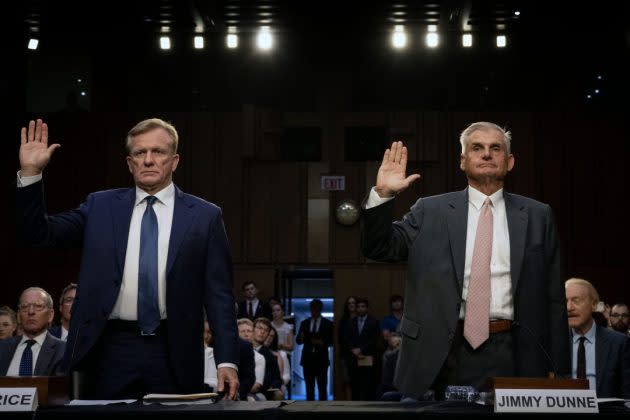PGA Tour’s Saudi Merger Looms as LIV or Die Gamble

Based on the testimony of its executives during last Tuesday’s U.S. Senate hearing, the PGA Tour’s existence depends on its tentative arrangement with Saudi Arabia’s Public Investment Fund (PIF) and the DP World Tour (European Tour) coming to fruition.
It’s a gamble that carries major risk.
More from Sportico.com
Startup Golf Shop Tests Equity Crowdfunding via Six-Club Bag
McIlroy's Scottish Win a Prize in Itself Ahead of Open Championship
Senate Grills PGA Tour Over LIV Deal, Ties to Saudis and China
Both PGA Tour COO Ron Price and policy board independent director Jimmy Dunne repeatedly made the case the PGA Tour cannot compete with LIV.
“My fear,” Dunne confided to Senator Ron Johnson (R-Wisc.), “is if we don’t get to an agreement” with PIF. “They are already putting billions of dollars into golf,” Dunne explained in notably stark terms. “They have a management team that wants to destroy the Tour. … They have an unlimited horizon and an unlimited amount of money. … I’m more concerned if we do nothing, they are going to end up owning golf.”
The PGA Tour’s sudden dependence on PIF and its $700 billion vault is striking.
Only six weeks ago the PGA Tour was dominating LIV in court, winning at every critical juncture.
All the LIV golfers suing the PGA Tour had dropped out of the case. PIF officials were ordered to testify under oath in the U.S., which would have forced them to face difficult-to-answer questions about how controversies surrounding the Saudi government impact PIF’s business. This would have set a new precedent on required testimony for PIF officials in other industries, too.
To be sure, the PGA Tour had its own set of risks in the litigation. While the tour was winning and seemed poised to prevail, it could have ultimately lost before a jury. The pretrial discovery process also presented possible hazards. Discovery might have revealed the PGA Tour had colluded or attempted to collude with sponsors, TV and the majors to exclude LIV. A settlement ended any of those risks from materializing.
Still, momentum was on the side of attorneys hired by the PGA Tour. It seemed like LIV was on the run.
And yet last Tuesday, LIV—which didn’t exist until 2021 and has struggled to capture fans and media interest—was portrayed by the PGA Tour as indomitable.
Remember, this is the same PGA Tour that has been around since 1968. It is the premier membership organization for touring pro golfers. It’s as dominant in golf as the NFL is in football or the NBA is in basketball.
But now the PGA Tour runs the risk of resembling the President who kneeled before Zod in Superman II.
The PGA Tour maintains it had no real choice. Its litigation success was apparently a Pyrrhic victory. LIV, the tour now suggests, was always going to win because of PIF’s money.
The PGA Tour might be right. But it now has to make sure the current rough outline, known as the “framework agreement,” comes to fruition.
If the deal falls apart or is blocked by the Justice Department, the PGA Tour would be left to battle LIV without threat of the courts intervening. Its only option would likely be a scramble for a deep-pocked buyer or partner. But who has the cash to keep up with PIF—Apple? Amazon? Some alliance of PE funds?
And what will the PGA Tour tell its golfers, who just watched some of its top-ranking officials say it can’t compete with LIV? And why would they even believe the PGA Tour, which urged loyalty from them while demonizing LIV only to turn around and strike a deal with the enemy?
PIF knows all this, which gives it considerable leverage in negotiations with the PGA Tour. PIF eliminated its biggest obstacle, which was the legal system, while retaining its greatest strength, money.
The still nameless new entity’s board would be appointed mainly by the PGA Tour, but as Senator Richard Blumenthal (D-Conn.) and several of his colleagues stressed, PIF will obtain instant power by funding the entity.
With this arrangement, questions about whether golfers can criticize the Saudi government on human rights or advocate positions on LGBTQ at odds with Saudi law won’t go away anytime soon.
Neither will questions about the future of pro golf and increasing foreign influence over American leagues.
Jim Gorant contributed to this story.
